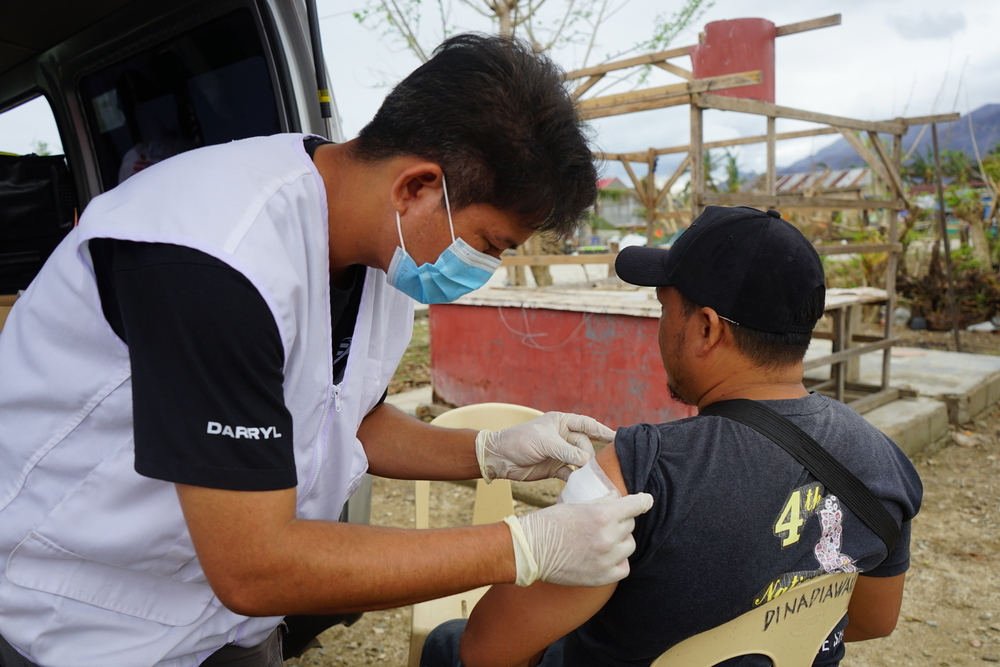AURORA, Philippines — In the aftermath of Supertyphoon Pepito, which left a trail of destruction across Aurora province, Doctors Without Borders (Médecins Sans Frontières or MSF) launched a week-long mobile clinic to aid the seaside community of Dinadiawan. Joined by the Department of Health and local healthcare workers, the team provided critical services, including medical consultations, mental health support, and treatment for injuries caused by the storm.
Severe injuries and medical challenges
Over five days, the medical team, led by Filipino Dr. Marve Duka-Fernandez, treated 549 patients. “Many suffered from respiratory infections and poorly controlled hypertension,” she shared. The team also attended to injuries from storm-related accidents and post-disaster cleanup efforts. Wounds caused by broken glass, punctures, and dog bites were common. “These injuries often go untreated due to people prioritizing repairs over their own health,” Dr. Duka-Fernandez noted.
Patients like 63-year-old Delia Macalipay exemplified these challenges. Injured during the typhoon, her swollen foot was exacerbated by prolonged exposure to rainwater. Another patient, Rosalinda Tabil, suffered a knife wound while preparing food for her displaced family. “A landslide swept our home away,” Tabil recounted, highlighting the dire conditions faced by many residents.
Mental health support for a community in distress
Beyond physical health, the team addressed the mental toll of the disaster. MSF mental health lead Sarah Jane Deocampo described counseling sessions where individuals finally felt free to express their fears and frustrations. “They often ignore their own emotions while focusing on family and survival,” Deocampo said.
One poignant case involved 73-year-old Evangelina Ramiro, who cares for her mute grandchildren and shared fears about their future without her. “After the session, she said, ‘For a little while, I felt like I was not drowning in my troubles.’”
Overcoming logistical challenges
Reaching the hardest-hit areas posed significant obstacles. Severe landslides and damaged roads made access to Dinadiawan perilous. MSF’s logistics team faced 14-hour journeys and frequent detours. “With six typhoons hitting the Philippines in one month, local response teams were overwhelmed,” said logistician Daryll Von Abellon.
Building resilience in Aurora
As part of their exit strategy, MSF trained 30 Aurora Provincial Health Office workers in psychological first aid, equipping the community to handle future crises. After a week of operations, MSF concluded its emergency response on December 2, 2024.

FAQ
What services were provided by Doctors Without Borders?
The mobile clinic offered medical consultations, mental health and psychosocial support, wound care, routine vaccinations, medication distribution, and child malnutrition screenings.
Why was Dinadiawan chosen for the intervention?
Dinadiawan, Dipaculao, was one of the hardest-hit areas in Aurora, with significant damage to infrastructure and a high number of displaced residents.
What were the main health issues treated?
Common conditions included respiratory infections, hypertension, and injuries such as lacerations and dog bites.
How did the community benefit from psychological support?
MSF provided psychoeducation, individual counseling, and group processing sessions to help residents cope with trauma and build resilience.
What challenges did the team face in delivering aid?
Access was hampered by landslides, damaged roads, and the sheer scale of the disaster, with six typhoons hitting the country in one month.
For more information, contact Doctors Without Borders Philippines.

